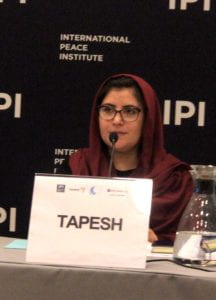by Anne Marie Goetz

On October 30, the Center for Global Affairs co-hosted a discussion at the International Peace Institute with the Georgetown University Institute on Women Peace and Security on the subject of : “Supporting a Durable and Inclusive Peace in Afghanistan: The Role of Afghan Women”. The event was at the initiative of CGA’s new Senior Visiting Fellow, Rina Amiri.
Speakers included an activist from the Afghan Women’s Network, the UK Ambassador to the UN, and the Director of the Division responsible for Mediation in peace processes, at the UN Department of Political and Peacebuilding Affairs. The panel frankly confronted the fact that Afghan women have been excluded from the US-Taliban talks, and risk being sidelined in eventual talks between the Afghanistan government and Taliban. Afghan women face the genuine prospect of seeing their hard-won rights lost as a bargaining chip or concession to bring the Taliban to the table, and even to a possible power-sharing arrangement. On all sides there appears to be an unspoken sense of resignation to the fact that it may become difficult if not impossible to sustain momentum around women’s rights in the country. It was noted that while usually peace talks address past human rights violations, they are also an opportunity to establish forward-leaning commitments to human rights. In the Afghanistan case, not only has there been obstacles to addressing past violations, but there also a serious risk of regression in a future settlement because of the potential return of the Taliban to the political order. At the same time, there is a tendency of international actors to presume or anticipate negative attitudes to women’s rights and to give in on this matter prematurely – what one speaker called ‘pre-emptive cringing’, offering concessions up-front instead of making the other side pay for concessions.
The Afghan speaker, Storai Tapesh, called on the international community not to diminish support for women’s participation, to support the domestic ‘Afghan Women Will Not Go Back’ campaign, and to invest in local institutions including women’s networks. The UK ambassador suggested that it is imperative to accelerate the legislative framework on women’s rights immediately in order to ensure that rights cannot be overturned in a settlement scenario. Courts need to be on a sounder footing in order to defend women’s rights laws, and more effort needs to go into getting women teachers and midwives into the provinces. Ultimately the aim is a comprehensive framework, and speakers stressed that a number of different routes to reaching this are possible. These should not mean secondary or side roles for women, and should ensure that women participate in negotiating the next steps for peace in Afghanistan.
